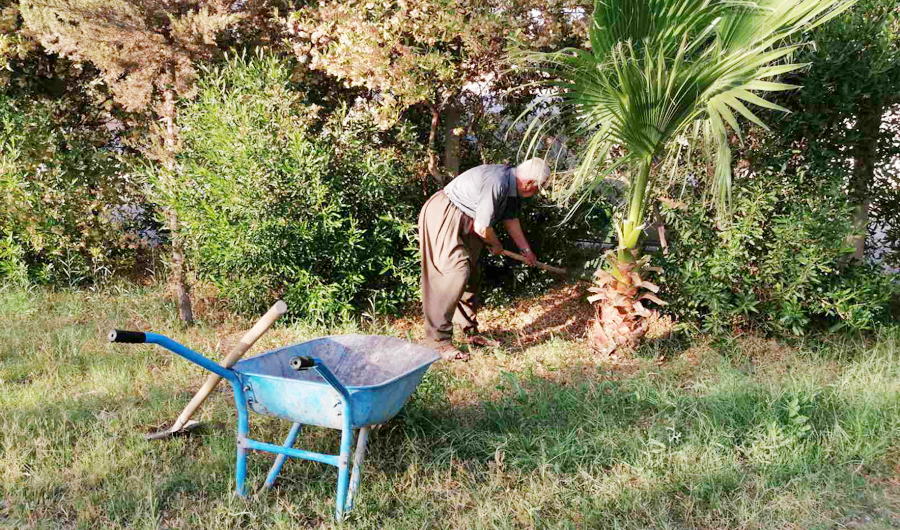Abu-Bakir Hassan, a 74-year-old pensioner, have decide to keep the one-donum park (0.1 hectare) green and save it from drying and getting yellow alike other parks and medians of the oil-rich city of Kirkuk as the local authorities declared their incapability of maintenance due to insufficient budget.
Hassan, resident of Imam Qassim Kurdish dominant neighborhood, spends hours every day in cleaning and watering the 15 types of trees, plants and flowers of the bloc park.
“The municipality as fired its workers so no one takes care of the public parks and gardens. This garden was about to dry and grass was everywhere so I decided it to serve it by myself.”
This garden was about to dry and grass was everywhere so I decided it to serve it by myself.
Kirkuk administration has terminated contracts of laborers in charge of the public parks and gardens one the Iraqi ministry of municipality stopped funding and sending allocated budget for this purpose.
Municipality of Kirkuk, in charge of garbage collection and greenery, declared more than once it is incapable of keeping the greenery which dropped from 4% in 2017 into half.
Hassan is not only cleaning the park & cutting grass, yet he is as watering the trees by the well in the park.
“The water pump was not working properly so I have brought a tank also. I am doing this for the last four years.”
Out of 184 public parks and gardens in Kirkuk, only few of it are couple of donums and most are smaller in area. Besides, there are 81 medians, ranging from 1-5 km long where trees are planted yet all about to dry out.
Faraidoun Adel, head of Kirkuk municipality, said they need minimum 1,000 workers to server greenery in Kirkuk while on the ground they have only 46 workers.
“We can’t maintain the parks and the trees so in some neighborhood, residents do it by themselves.”
“We can’t maintain the parks and the trees so in some neighborhood, residents do it by themselves.”
The efforts spent in the last ten years by Kirkuk administration to boost greenery in the city have sharply failed as greenery is diminishing due to lack of adequate budget for irrigation and maintenance, making the environment of Kirkuk dusty and untidy.
End of 2010, local officials of Kirkuk municipality have told KirkukNow they will boost greenery. In 2014, they declared their plan to surround Kirkuk with a green belt to contain dust.
The five oil fields of Kirkuk have produced 2.86 million barrels in April compared to three million barrels last March generating 177 million Dollars USD while in March it made up $195 million for Iraq's national revenues, Iraqi ministry of oil said.
Video: Hassan, 74, voluntarily serves the public park of their bloc to keep it green.
Hassan was doing well in the first three years of serving the park but now it is getting hard for him as he has heart disease so the residents are giving him a hand.
Kawa Ghafour, a civil servant and neighbor of Hassan, said they purchase whatever required like soil, plastic hose, water pump and others.
“We can’ stand seeing it getting dry so we pay from our pockets.”
“We can’ stand seeing it getting dry so we pay from our pockets.”
The province of Kirkuk, Iraq's second largest oil reserves, is ethnically a mixed province of 1.2 million Kurds, Sunni and Shiite Arabs, and Turkmen. It has long been at the center of disputes between Baghdad and the autonomous Kurdistan Regional Government KRG.
Currently Kirkuk is under control of Baghdad since 2017 with local police downtown while Iraqi army and pro-Shiite militia Popular Mobilization Forces PMF known as Hashid aal-Sha’abi deployed at the outskirts.
The political tension between Baghdad and Erbil left Kirkuk and the disputed territories left the province missing the basic public services. Garbage collection is one of the main challenges for people in their daily life in the last years in particular. Power shortage is blamed for low supply by Baghdad compared to the high demand by people for consumption.
In the last few years, several non-governmental organizations NGOs distributed plants in a campaign to expand green spaces.
Kokar NGO for maintenance and voluntary work in the last three years have distributed minimum 20,000 plants to people in order to be planted on sidewalks and medians yet the challenge is irrigation and maintenance by the municipality as temperature exceeds 45-50 at the blazing summer.
Mohamed Abdul-Khaliq, media officer of Kokar, said 60% of the seeds and sprouts distributed have turned green yet it requires continuous irrigation.
“Unfortunately, we can’t support the volunteers serving the parks as we don’t have adequate budget and personnel,” Abdul-Khaliq said. “Fiver parks are served by the residents and we extended our appreciation for that.
Hassan’s consent originates from seeing the neighbor especially kids spending a nice time in the park.
“I feel pleased and proud by saving the garden from draught. It’s my pleasure to see my family and the kids in the bloc relaxing here. I call on our young people to behave eco friendly and maintain the gardens.”





